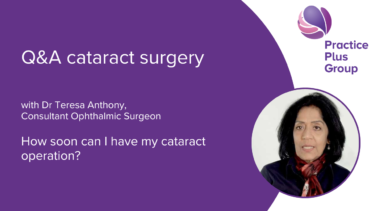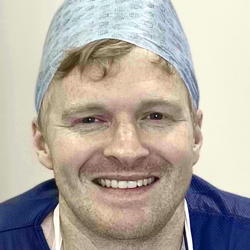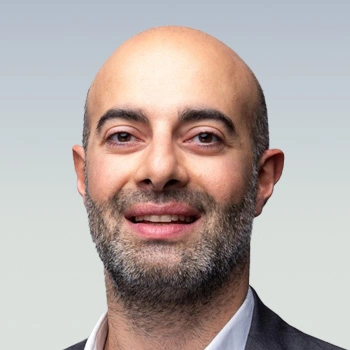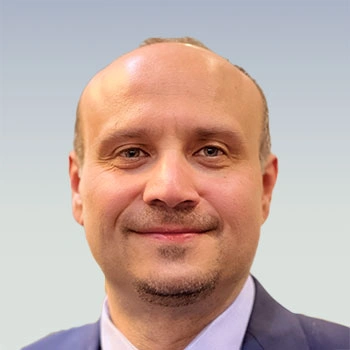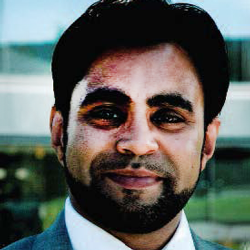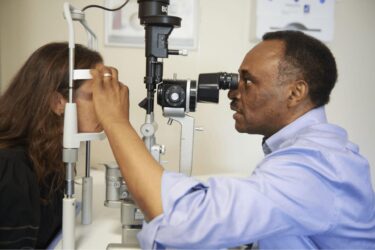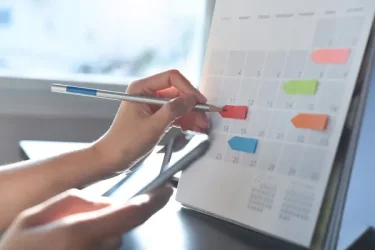Estimated reading time: 4 minutes
You cannot underestimate the important role that having clear vision plays in your everyday life. So, if you suspect you’re suffering the symptoms of cataracts, you need to take action. Booking a cataract consultation is a great way to start. In this article, we’ll explore waiting times, cost, and what to expect at yours.

Private cataract surgery at a glance
- Waiting time: 4-6 weeks
- Cost: from £1,995
- Ways to pay: self-pay, finance, and insurance
- Hospital stay: same-day procedure
- Procedure time: 15-30 minutes
What is a cataract consultation?
Put simply, a cataract consultation is an opportunity for your consultant to decide whether you need eye surgery or treatment and what that potentially looks like. But actually, it’s much more than that. A cataract consultation gives you the opportunity to ask all manner of questions about your eye condition and the proposed treatment.
Among other things, you may wish to ask about how long your private cataract surgery will take, what you can expect in terms of recovery timelines, and when you’ll be able to drive again.
How much does a private cataract consultation cost?
Before you even step through the doors of a hospital, aside from wanting to know the cost of private cataract surgery itself, this is likely to be one of the most important questions you’ll want answered. Here, there’s good news and not so good news. In the next section, we’ll start with the good.
Comparing private cataract consultation fees in the UK
At Practice Plus Group, our private cataract consultations cost £95. This fee is inclusive of diagnostic tests like X-rays and blood tests that represent a thorough assessment.
For the not so good news, the table below shows the prices for consultations at other private healthcare providers.
Private healthcare provider | Cost of cataract consultation |
|---|---|
Practice Plus Group | £95 |
Nuffield Health | from £150 |
Circle Heath Group | from £200 |
Spire Healthcare | £120-£500 |
How to pay for your consultation and cataract surgery
At Practice Plus Group, there are two ways to pay for a private consultation:
- As a self-pay patient. This involves making a one-off payment of £95
- Via a pre-existing health insurance policy. Your insurance provider will need to give their approval and an authorisation code to proceed.
When it comes to cataract treatment, if you choose self-pay surgery, you have three ways to cover the cost:
- A one-off lump sum payment
- Via a finance plan
- Via private health insurance.
If you pay through private medical insurance, you will need to ensure your provider features on our list of approved insurers.
Waiting times for a cataract surgery consultation
Perhaps the second most important question patients ask about cataract consultations is around waiting times.
As with the waiting time for cataract surgery, you can generally expect a longer wait for a consultation if you’re having NHS treatment. Waiting times for NHS consultations can be as long as those for the surgery itself and typically run into months. For example, the current waiting time for ophthalmology at the Sandwell and West Birmingham NHS Trust hospital is 15 weeks.* This is exactly the same as the waiting time for treatment.
If you’re having your cataract consultation at Practice Plus Group, you can typically expect to wait between a couple of days and a week, depending on hospital location.
What is involved in a cataract consultation?
Now that we’ve answered questions around the cost of a cataract consultation and how long you might wait for it, it’s time to explore the session itself.
How long does a cataract consultation take?
Typically, a cataract consultation takes around 30 minutes. However, to be on the safe side, it’s a good idea not to book any important meetings within an hour or so of your appointment.
What is done during a cataract consultation appointment?
First off, a nurse or healthcare assistant will ask you for some information about your eye health, along with your personal and family medical history.
Diagnostic tests are then performed and drops to dilate your eye applied to allow for a proper examination. These tests will likely include measurements of your vision, eye pressure and the eye itself to decide on the best lens to suit you. Don’t worry – none of these tests are painful or invasive, but if you do experience discomfort, let your consultant know immediately.
Finally, an optometrist or consultant will examine your eyes, discuss the benefits and risks of cataract surgery, and ask you to sign a consent form.
Cataract pre-op assessment and instructions
You are strongly advised not to drive to your appointment. This is because dilation drops (eye drops) will be applied, making driving impossible. If you wear glasses or contact lenses, please remember to bring them with you, along with any medication you’re currently taking.
You should have received a health questionnaire before your appointment. If you’ve filled this in – great! If not, don’t worry, we can cover it off during the consultation. Let us know if you’ve had any past eye treatments or surgeries too.
Even if it’s raining, it might be useful to bring your favourite pair of sunglasses to help you deal with any glare.
Exploring artificial lens options
Cataract patients with pre-existing eye issues can choose from a range of different options when it comes to the lenses on offer at Practice Plus Group. For example, if you want to have more independence from your glasses, multifocal lenses might be the best option for you.
Standard intraocular lenses (IOLs) are available as standard on the NHS. These lenses provide good distance vision but do not correct pre-existing astigmatism, near, or middle-distance vision.
During your consultation, your eye specialist will help and advise when it comes to choosing the best cataract lens for you and your specific needs.
Eye examination, scans and tests
It’s likely that several eye exams will be carried out during your appointment. These can include vision and eye pressure measurements, and ocular biometry. This enables a suitable lens to be selected for implantation. Other tests may include Optical Coherence Tomography (OCT), retinal photography, or ultrasound scans.
Who will you see?
Typically, the team overseeing your procedure consists of the cataract surgeon, healthcare assistants, nurses, optometrists, and ophthalmic consultants.
How do I prepare for a cataract consultation?
From thinking about what to bring to choosing the right questions to ask, there are a few things you can do to prepare for your cataract consultation.
How to book a cataract consultation?
To book a cataract consultation with Practice Plus Group, you can either:
- call us on 0330 818 8945
- complete and submit an online enquiry form.
Once this is done, a member of our booking team will be in touch to book you in at a time that suits you.
Choosing a cataract consultant
Cataract surgery is a very common procedure in the UK, so it’s unlikely you’ll struggle to find consultants. So, it’s more a question of whether you can find one that suits your specific needs.
One thing to make sure you do is research. Resources such as The Royal College of Ophthalmology makes finding and choosing an expert cataract surgeon a much more straightforward task.
What to bring
Here’s a helpful list of things to remember to bring:
- glasses or contact lenses (if you wear them)
- any medication you’re currently taking
- sunglasses to help with glare for after your appointment.
- the completed health questionnaire you should have received before your appointment.
Questions to ask your cataract consultant
From what to wear on the day to your expectations of recovery, we’ve put together a detailed list of all the questions to ask before cataract surgery.
How to make the most out of your consultation
Our best advice is to come prepared. This means doing your research and noting down all the questions you want to ask your cataract consultant about the upcoming procedure. We appreciate there might be quite a lot of information for you to take onboard, so it’s a good idea to bring a friend or family member along to help you out.
A word from Teresa, Practice Plus Group cataract consultant
How long after consultation is cataract surgery?
This timeframe will differ depending on the healthcare provider. NHS patients should expect a longer wait between consultation and surgery.
One way to have your cataract surgery sooner is to seek healthcare through Practice Plus Group. With us, you’ll be able to have cataract surgery just 4-6 weeks after your consultation.
Book a cataract consultation near you
We have a wide network of first-class surgeons and consultants working across the country. Use the location and treatment filters on our dedicated consultants page to find a consultant near you, or take a look through the menu below.
-

Adel Zawia
Eye treatments
Practices at:
- Gillingham
-

Arpita Jain
Eye treatments
Practices at:
- Rochdale
-

Ayoub El Mourabit
Eye treatments
Practices at:
- Birmingham
-

Barmak Zadeh
Eye treatments
Practices at:
- Rochdale
-

Dan Nolan
Eye treatments
Practices at:
- Rochdale
-

Darren Kirton
Eye treatments
Practices at:
- Shepton Mallet
-

Edward Ridyard
Eye treatments
Practices at:
- Rochdale
-

Fadi Alfaqawi
Eye treatments
Practices at:
- Emersons Green
-

Farhan Zaidi
Eye treatments
Practices at:
- Ilford
- Gillingham
-

Francesco D’Alterio
Eye treatments
Practices at:
- Ilford
- Gillingham
-

Graham McCollum
Eye treatments
Practices at:
- Rochdale
-

Harish Bhakta
Eye treatments
Practices at:
- Rochdale
-

Imad Wafaie
Eye treatments
Practices at:
- Rochdale
-

Jonas Laursen
Eye treatments
Practices at:
- Shepton Mallet
- Emersons Green
- Devizes
-

Kalman Hodosi
Eye treatments
Practices at:
- Rochdale
-

Konstantinos Kaprinis
Eye treatments
Practices at:
- Rochdale
-

Madyan Qureshi
Eye treatments
Practices at:
- Rochdale
-

Manhal Al-Gurgia
Eye treatments
Practices at:
- Rochdale
-

Marzena Raszewska-Steglinska
Eye treatments
Practices at:
- Emersons Green
- Devizes
- Shepton Mallet
-

Massimo Sibilio
Eye treatments
Practices at:
- Gillingham
-

Mustafa Yusuf
Eye treatments
Practices at:
- Rochdale
- St Mary's Portsmouth
-

Omar Rafiq
Eye treatments
Practices at:
- Rochdale
-

Piergiacomo Grassi
Eye treatments
Practices at:
- Rochdale
-

Priya Prakash
Eye treatments
Practices at:
- Ilford
- Gillingham
-

Rubina Rahman
Eye treatments
Practices at:
- Rochdale
-

Shweta Anand
Eye treatments
Practices at:
- Ilford
- Gillingham
-

Siddharth Agrawal
Eye treatments
Practices at:
- Rochdale
-

Yit Chiun Yang
Eye treatments
Practices at:
- Barlborough
Sources and references
1 My Planned Care: Sandwell and West Birmingham Hospitals NHS Trust
(Practice Plus Group is not responsible for and does not control the content displayed on external websites.)

Acknowledgements
FAQs about cataract surgery consultations
Not yet found the information you’re looking for? Our cataract surgery consultation FAQs are here to help!
Yes. With a private cataract consultation, there’s no need for a GP referral. Simply call us on 0333 060 9390 or fill out an online enquiry form and we’ll be in touch to get you booked in.
Yes, dilation drops will be applied to ensure a comprehensive examination of your eye.


